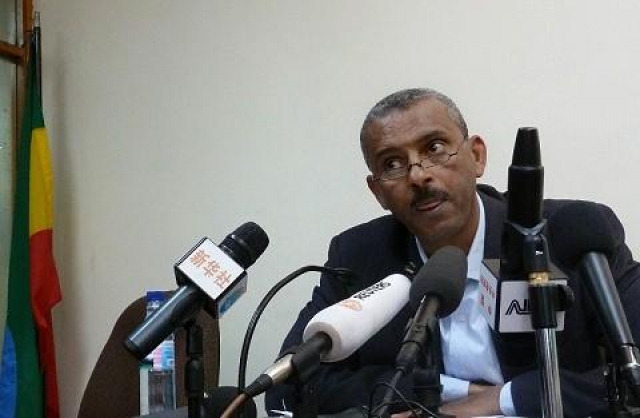By Associated Press
ADDIS ABABA, Ethiopia — Eritrea’s president said Monday that attacks on targets inside his tiny Horn of Africa nation by its archrival Ethiopia was the “handiwork of Washington.”
Ethiopia said on March 15 it attacked three military posts inside its northern neighbor Eritrea. The country said it launched the attack because Eritrea was training “subversive groups” that carried out attacks inside Ethiopia.
Read more.
—
Related:
Are Ethiopia & Eritrea Heading Back to War? (BBC World Service)
Proxy War Stokes Tension Between Ethiopia, Eritrea (VOA)

Ethiopian government spokesman, Shimeles Kemal speaks in Addis Ababa on March 15, 2012, where he announced that Ethiopia had attacked an Eritrean military base, where rebel groups are armed and trained. (Photo: AFP)
Peter Heinlein | Addis Ababa
Ethiopia’s military strike against targets in Eritrea last week has opened a new phase on the proxy war the Horn of Africa neighbors have been waging for more than a decade. Attention is focused on a little-known rebel group that is alleged to have been involved in cross-border attacks.
Tension along the Eritrea-Ethiopia border rose late last week when Ethiopian forces struck what they said were military camps inside Eritrea.
Spokesman Shimeles Kemal justified the strikes as retaliation against a shadowy rebel group blamed for killing and kidnapping European tourists two months ago in Ethiopia’s Afar region.
“The posts attacked had been used by the Eritrean government for training, as a military garrison for these subversive groups,” he said.
Analysts say the incident is the first cross-border attack by the sides since they ended a two-year border war in 2000. That fighting killed as many as 80,000 people and ended inconclusively.
Eritrea described last week’s military incursion as “flagrant aggression” designed to divert attention from Ethiopia’s illegal occupation of Eritrean territories. A statement said Eritrea would not be drawn into war with its far bigger neighbor.
Ethiopia called the strike a “proportional response” against a proxy group that had been staging terrorist attacks with Eritrea’s knowledge and approval.
Ethiopian Foreign Ministry spokesman Dina Mufti accused Eritrea of trying to mask its proxy war on Ethiopia through the use of imaginary rebel groups.
“They have tried to evade responsibility by blaming the act on some organization, dubious organization that is not significant, and that doesn’t mean anything in that region,” said Mufti. “They have tried to shift the blame to a bogus organization.”
Little is known about the rebel group called the Afar Revolutionary Democratic Unity Front, or ARDUF. Analysts say the group occasionally attacks tourists on the slopes of Ethiopia’s Erta Ale volcano, then seemingly disappears into the desert for years at a time.
Ethiopia says ARDUF is trained and financed by Eritrea. Eritrea says the rebels are a pretext for Ethiopian aggression.
E-mails the group sent to reporters during the past two months tell their side of a clash with Ethiopian troops in January that left five European tourists dead. The e-mails, written in fluent English, also tell of the rebels’ attempts to free two other tourists they captured in the incident. The Europeans were released early this month.
Return e-mails to ARDUF, asking for more information, were not answered.
Horn of Africa analyst and former U.S. ambassador to Ethiopia David Shinn says it is impossible to know whether ARDUF is real or merely a tool in the proxy war.
“I’ve seen no proof of that,” said Shinn. “That’s just taking Ethiopia at its word. At the same time, it’s certainly plausible. On the other side of the fence, one should point out that Ethiopia also has a record of being supportive of Eritreans who oppose the regime in Asmara.”
Shinn notes that Ethiopian Prime Minister Meles Zenawi stated in parliament last April that his government would actively support groups trying to overthrow Eritrean President Isaias Afwerki. Mr. Meles’s comment came after Ethiopia accused Eritrea of trying to stage high-profile bomb attacks in Addis Ababa during an African Union summit. Eritrea strongly denied the charges.
The Reuters news agency and an Eritrean opposition website reported a second wave of Ethiopian strikes on Saturday near the town of Badme, the flash point of the war that erupted in 1998. The opposition site [awate.com] on Monday said Ethiopian forces were still occupying several villages on the Eritrean side of the disputed border.
Ethiopian officials strongly denied those reports, and officials in Addis Ababa said there had been no direct clashes between military forces of the two countries.
David Shinn recalls a similar cross-border incursion when he was U.S. envoy to Ethiopia in 1997. He says that incident was among those cited by Eritrea the following year when war broke out.
—
Related:
UPDATE 2-Ethiopia again attacks rebel targets in Eritrea (Reuters)
UPDATE: Eritrea says Ethiopia attacked us over border dispute (AP)
Ethiopia Says Its Forces Attacked Military Base in Eritrea (VOA)
—
Read more news at VOA.